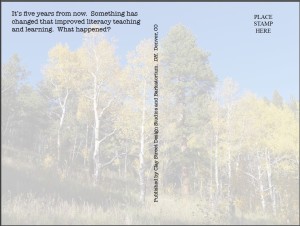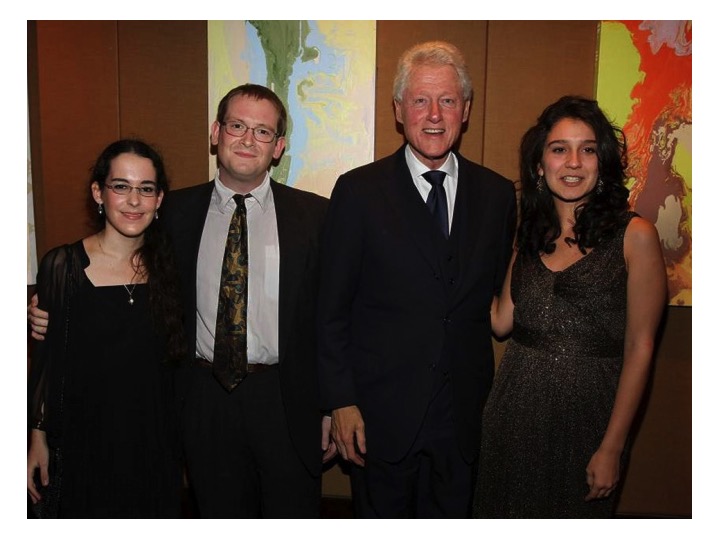
2012 student winners, plus another guy.
Alec Baldwin checked how to pronounce my name. Keith Richards sat beside Bill Clinton. It was the top floor ballroom of the Mandarin Oriental Hotel in New York, and I was introducing winners of the NCTE/Norman Mailer National Writing Awards. Along with their prizes, three students received $5000, and a South Carolina English teacher and NCTE member Kay McSpadden got a check and a plaque from Garrison Keillor who, from the podium, took particular delight that this wife of a Presbyterian minister had titled her winning story “Why Women Moan in Bed.”
I recount that evening, October 4, 2012, because NCTE is currently inviting submissions for the 2016 NCTE/Mailer Awards, in the categories of creative nonfiction and poetry. Complete information is available at http://www.ncte.org/awards/nmwa. It costs nothing to submit, but the deadline is May 2. NCTE members do initial rounds of reading up to a group of finalists, and panels of well-known writers select the winners.
Now, you may be curious, at least, about these particular awards—perhaps even skeptical. After all, Norman Mailer was a particular, sometimes polarizing figure in American letters. Further, contests themselves can be problematic, sometimes conflicting with learning. My friend and current Mailer awards chair Bonnie Sunstein, (from the University of Iowa and from whom I swiped this blog title), and I reviewed the history, the complications, and the values of these awards in a session at the NCTE Convention in 2015.
The history, in a nutshell, was that after Mailer died in 2008, Larry Schiller (author, director, photographer, Emmy winner, and co-author/friend of Mailer) contacted Kent Williamson about sponsoring student writing contests in his honor. In addition to generous funding, Schiller could bring high-level contact to the arts and entertainment world. Indeed, the people involved over the years, beyond those mentioned, have included Toni Morrison (who was once an NCTE member, she told me), Dick Cavett, Maya Angelou, Salman Rushdie, John Waters, Ken Burns, Oliver Stone, Joyce Carol Oates, Muhammad Ali, and countless others. The New York Times regularly runs a story on the awards. Kent and the Executive Committee asked me to work with Schiller, and the awards were timed in conjunction with the first National Day on Writing.
I suggested that the awards should be in creative nonfiction, among whose genres Mailer had certainly worked successful. There were plenty of fiction and poetry contests, but we needed to encourage students—and their teachers—to write memoir, personal essay, literacy journalism, and so on. Schiller agreed. The result has been a trove of student work stunning in both content and form, giving voice to the lives of high school and college writers. Consider, for example, the title of this piece, by a high school student:
“Things about My Parents I Forgot to Tell the Woman Who is Deciding Custody of My Brother, Sister, and Me”
Or these opening lines from another one:
‘Yes, my father left my family over an online game called Second Life.
No, I’m not kidding.
I wish I were.”
Or this incredible opening by a third:
“My hometown is made of break walls surrounding a harbor where young children jump off and a man who once gave me an eagle feather got drunk and floated out on a mattress to the middle of the harbor at three in the morning and was torn through with the hull of a speed boat driven by a man who’s daughter was my best friend and the owner of the bar. They had chatted that night, the killed man and the killer, and the killer told the killed man to leave his bar because he was closing down for the night and the killed man had had too much Jack Daniels to stay. That boat came up in between that man’s legs and all he left was that wife, those kids, and that eagle feather.” –Kiley Harrison
Or this first sentence from the 2010 college winner:
One day in Saigon in 1987—nine years after he had failed his escape attempt by boat, was captured, was imprisoned, ran away, was beaten unconscious and recaptured, was imprisoned, dug hundreds of thousands of spoons of dirt, ran away, was recaptured, was imprisoned, chained, and hung upside down in a cell every night, escaped with the help of a Communist friend, had arrest warrants posted on him, five years after he had settled in Dalat in his mother’s house, waited day by day for the police to come get him, met my mother, married her, and had two children—my father was hiding out and talking with his uncle, who translated American papers and documents for clients, and his uncle told him about a certain document he had translated recently, and this document explained that veterans of the Army of the Republic of Viet-Nam (ARVN) were welcome to petition for their and their family’s emigration to the United States of America. –Minh Phuong Nguyen “Suffering Self: Khồ Mình, Mình Khồ”
You can read great writing from winners on the NCTE website, including Kay McSpadden’s story that so intrigued Keillor. Just as importantly, you can encourage students to tell their own stories, explore their own lives, make a space for writing beyond reports, analyses, and arguments.
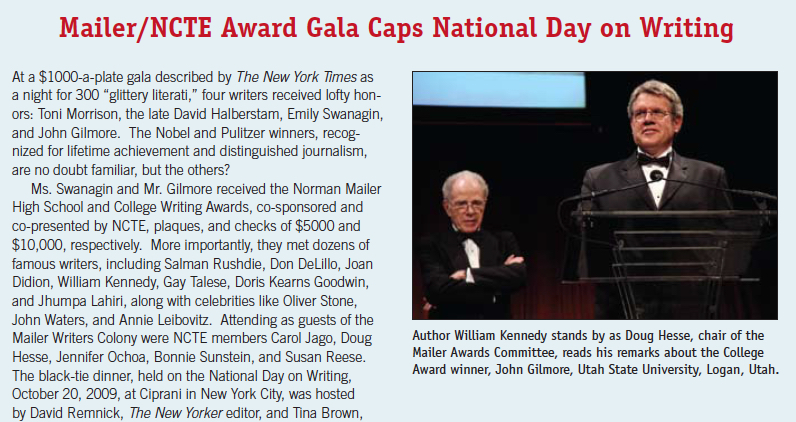
NCTE Council Chronicle story of the first Mailer awards Nov. 2009.
Doug
 April is poetry month. I thought of this poem I wrote years ago, for Andrew’s last high school chorus concert. (The school colors were green and yellow).
April is poetry month. I thought of this poem I wrote years ago, for Andrew’s last high school chorus concert. (The school colors were green and yellow).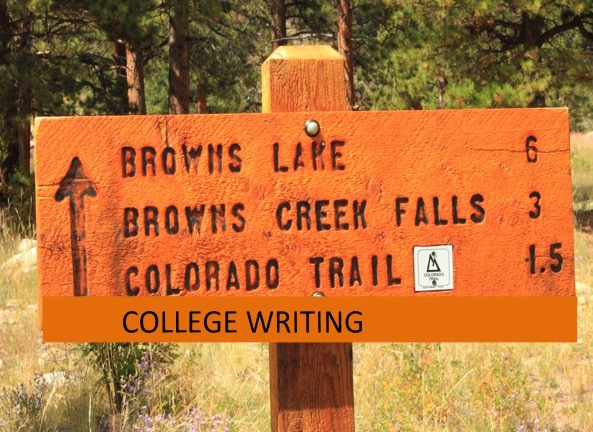 Yesterday, I received the following email from a local high school student. I’m pretty sure my reply was less helpful than she might have wanted, but the questions didn’t lend themselves to the more direct answers I’m guessing that she and her teacher had wished for. I hope she writes back.
Yesterday, I received the following email from a local high school student. I’m pretty sure my reply was less helpful than she might have wanted, but the questions didn’t lend themselves to the more direct answers I’m guessing that she and her teacher had wished for. I hope she writes back.


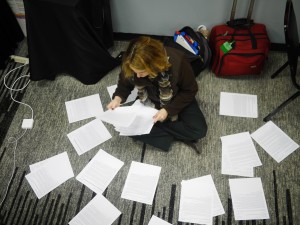 This is one of the more exciting weeks each year in life of NCTE. In the space of four energetic days in Washington, DC, three things happen: Advocacy Day, an Executive Committee meeting, and Annual Convention Planning. Last year we were greeted by a snowstorm that shut the federal government; I’ll be happy not to have that drama this time around. I’ll tell you about each of these activities, starting in this post with the convention planning process.
This is one of the more exciting weeks each year in life of NCTE. In the space of four energetic days in Washington, DC, three things happen: Advocacy Day, an Executive Committee meeting, and Annual Convention Planning. Last year we were greeted by a snowstorm that shut the federal government; I’ll be happy not to have that drama this time around. I’ll tell you about each of these activities, starting in this post with the convention planning process.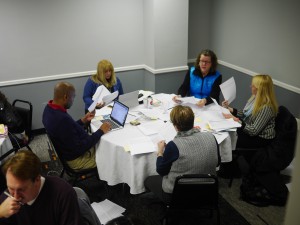
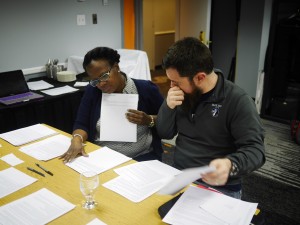 Level Two
Level Two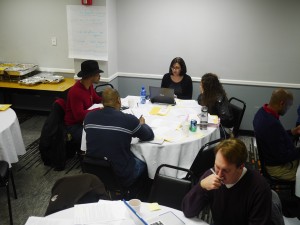 Let’s imagine that you checked “Whole Language” for your proposal on “The Apostrophe” because you were emphasizing ways of teaching this kind of punctuation that fit the principles of whole language instruction. (Humor me!) Let’s imagine, further, that the Secondary group determined that your proposal wasn’t one of the 150 it could accept. But there’s also a Whole Language review team, which convenes along with other review groups. They look at all of the Whole Language-designated proposals and choose those that best meet the spirit of the strand. They, like the other Strand groups, have an allotment of program slots they can fill (let’s imagine 10 of them) above and beyond the ones apportioned previously. Of course, your “Apostrophe” proposal may well have been accepted by the Secondary group. Congratulations! If the Whole Language reviewers agree that it meets their criteria, it will show up in the program with the strand designation, and they’ll be able to use their program slots for something else.
Let’s imagine that you checked “Whole Language” for your proposal on “The Apostrophe” because you were emphasizing ways of teaching this kind of punctuation that fit the principles of whole language instruction. (Humor me!) Let’s imagine, further, that the Secondary group determined that your proposal wasn’t one of the 150 it could accept. But there’s also a Whole Language review team, which convenes along with other review groups. They look at all of the Whole Language-designated proposals and choose those that best meet the spirit of the strand. They, like the other Strand groups, have an allotment of program slots they can fill (let’s imagine 10 of them) above and beyond the ones apportioned previously. Of course, your “Apostrophe” proposal may well have been accepted by the Secondary group. Congratulations! If the Whole Language reviewers agree that it meets their criteria, it will show up in the program with the strand designation, and they’ll be able to use their program slots for something else.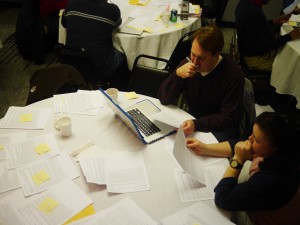 needs of NCTE members.
needs of NCTE members.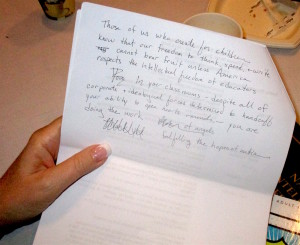

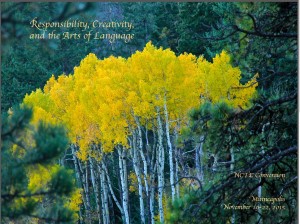 December 20, 2015
December 20, 2015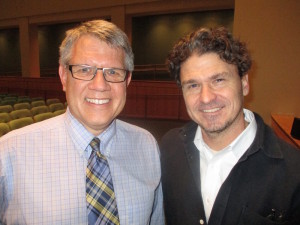 ny/poignant story of a young teen boy with a vision-occluding zit who audaciously proposed giving a speech on bicycling to the inner mantel of the earth (“because it would be downhill all the way”), only to have a remarkable teacher tell him to go for it. That teacher—Eggers’ own high school teacher, Peter Ferry—was in the audience and came to the stage with thunderous applause, where Eggers gave him the wrapped manuscript of his next book.
ny/poignant story of a young teen boy with a vision-occluding zit who audaciously proposed giving a speech on bicycling to the inner mantel of the earth (“because it would be downhill all the way”), only to have a remarkable teacher tell him to go for it. That teacher—Eggers’ own high school teacher, Peter Ferry—was in the audience and came to the stage with thunderous applause, where Eggers gave him the wrapped manuscript of his next book.